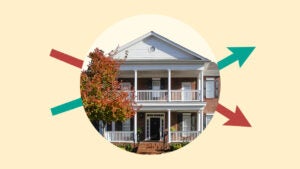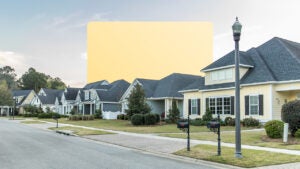Study: Owning a home costs over $21,000 a year in hidden expenses

Key insights
- The average annual cost of owning and maintaining a single-family home in the U.S is more than $21,000 a year, according to a new Bankrate study.
- Hawaii and California top the list of states with the highest homeownership costs (over $30,000 annually); West Virginia and Mississippi are the lowest, at less than $15,000 a year.
- East and West Coast homeowners tend to pay more in hidden costs than those in the South and Midwest.
- Home maintenance alone averages more than $8,800 a year, accounting for the largest chunk of hidden homeownership costs.
The $21,400 surprise: Hidden costs of owning and maintaining a home in 2025
Buying a home is the biggest single expense most people will ever undertake. But many new homeowners are surprised to find that, after they have the keys in hand, the costs just keep on coming – and they’re adding up to a considerable sum.
The average annual costs associated with owning and maintaining a typical single-family home in the U.S. amount to $21,400 in 2025, according to Bankrate’s new Hidden Costs of Homeownership Study. We call them “hidden” because they’re often overlooked or unforeseen by homeowners, especially when they’re budgeting to buy a place. But these ongoing expenses are a reminder that the true cost of homeownership goes well beyond the property’s purchase price and the scheduled mortgage payments.
To determine the average hidden homeownership costs across the U.S., both nationally and by state, Bankrate analyzed prices for property taxes, homeowners insurance, utilities, internet and cable bills. We also calculated a sum for maintenance and repairs, by taking 2 percent of each state’s median single-family home price, a standard measure set by Fannie Mae. All figures were adjusted for inflation using the Consumer Price Index. (Note: Our analysis covers 49 of the 50 states: New York was excluded due to data limitations.)
Why are homeownership and maintenance costs so high?
Houses have always been something of a money pit, as homeowners affectionately say. But if that pit seems deeper than ever, it’s with good reason. The cost of homeownership in the U.S. has climbed in recent years, fueled by inflation, rising interest rates and a highly competitive housing market.
It all begins with the cost of acquiring a place. As of April 2025, the median home price stood at a near-record $437,942, according to real estate platform Redfin, up 44 percent from 2020. There’s also the sting of higher mortgage rates, which are double what they were five years ago. In short, these days homebuyers need to borrow more money, and borrowing costs significantly more.
Small wonder that Bankrate’s 2025 Housing Affordability Study found that Americans need a six-figure annual household income – of $116,986, to be precise – to comfortably afford a home today. Unfortunately, American incomes aren’t keeping pace with residential real estate costs. A recent analysis by home improvement site Fixr found that, over the last quarter-century, housing prices have increased 197 percent, while the median household income has only increased by 40 percent.
But buying is just the beginning: The squeeze on wallets intensifies after one becomes a homeowner. Higher home values mean bigger property taxes and homeowners insurance policies (and premiums). And in the last five years, inflation has also been rearing its ugly head in the rising cost of everything, including construction/home improvement materials, goods and services – and labor. From April 2020 to April 2025, the cumulative inflation rate amounted to 25 percent, according to the U.S. Bureau of Labor Statistics, which means an item that cost $100 five years ago costs $125 now.
That’s why consumers are particularly feeling the pain in the form of home maintenance costs – the highest of our hidden expenses at $8,808 a year. That’s almost two times the cost of utilities/energy ($4,494), double the cost of property taxes ($4,316), four times the cost of home insurance ($2,267) and six times the cost of internet/cable ($1,515).
These expenses have emerged as a major source of homebuyer remorse. In Bankrate’s 2025 Homeowner Regrets Survey, nearly half of homeowners (42 percent) who had at least one misgiving about buying their home cited maintenance and other hidden costs as being more expensive than expected. The unforeseen upkeep and the ongoing financial burden of maintenance and minor repairs was, in fact, the single most common regret (among those who had them).
States with the most expensive homeownership costs
The top five states with the highest hidden costs of homeownership include three Western states and two Eastern states.
States with the least expensive homeownership costs
Three Southerners and two Midwesterners comprise the list of the states with the least-expensive hidden homeownership costs.
Regional trends: homeownership and maintenance costs by state
Bankrate’s study found a wide range in homeownership costs across the country, with costs in Hawaii, the most expensive state, nearly triple what they are in West Virginia, the least expensive.
Not surprisingly, the East and West Coast states tend to have the highest hidden costs. Their high home values (which influence maintenance budgets) and steep property taxes play a significant role in making them so expensive.
All 10 states with the highest costs (Hawaii, California, New Jersey, Massachusetts, Washington, Connecticut, New Hampshire, Colorado, Florida and Rhode Island) are among the 20 most expensive states for home maintenance budgets and the 25 most expensive states for property taxes.
More moderate costs prevail in the middle of the country. Southern and Midwestern states offer some of the lowest hidden costs, thanks to lower housing prices, utility bills and property taxes. The 10 lowest-cost states (West Virginia, Mississippi, Indiana, Missouri, Arkansas, Iowa, Michigan, Ohio, Alabama and North Dakota) have lower-than-average home maintenance budgets and property taxes.
Hidden costs of homeownership: behind the numbers
A variety of interrelated factors are behind the high hidden costs of homeownership, and they reflect some interesting socio-economic trends.
Not surprisingly, states with the highest home prices tend to have the highest expenses too: The cost of living is just pricier in these places overall. But the increase in home values, in particular, has ripple effects – as in property taxes. According to real estate data analyst Cotality, property taxes for single-family residences have risen an average 27 percent from 2019 to 2024. And once they go up, they often lag in going down, even if housing prices soften.
Rivaling the rise in property taxes is that of residential utilities: electric and gas bills, increasing to the tune of nearly 30 percent since 2021 and almost 40 percent since 2019, respectively, according to the U.S. Energy Administration. Largely due to rising transmission and distribution costs, those increases are outpacing the general inflation rate.
Also outpacing inflation: the notorious rise in homeowners insurance premiums, which have grown by 24 percent nationwide from 2021 to 2024. Again, some of the increase reflects rising home prices – the more valuable a property, the more it costs to insure it – but the growing frequency of extreme weather events and natural disasters has played a major part as well.
An increasing number of homes are located in homeownership association (HOA) neighborhoods or communities: 29% of the U.S. population lives in an HOA as of 2021, according to the Community Associations Institute. The U.S. Census Bureau calculates the average monthly HOA fee as $243, which equals $2,913 a year.
By far, the single most expensive homeownership cost is maintenance: routine upkeep and minor fixes to a property. The impact of general inflation on the expenses has been significant, as we noted earlier. Beyond Bankrate’s calculations, there are reasons why these costs are rising, and are likely to continue to increase too – namely, the nation’s aging housing stock. The median age of an American home is over 40 years old. Small wonder that in 2023, the average maintenance spending per homeowner for houses built before 1980 climbed 76 percent, notes the Joint Center for Housing Studies at Harvard University.
With homes that old, “upkeeping” often segues into “upgrading,” as major features and systems require replacement. Given today’s high home prices, many people are opting to stay put and fix up, instead of moving; many older Americans want to age in place in their homes too. Year-over-year spending for home renovation and repair will reach a record $526 billion by the first quarter of 2026, the Joint Center predicts.
Many of these expenses, like property taxes and utilities, are necessary and non-negotiable. Others, relating to repair and maintenance, are important investments, crucial for building home equity. But add all these hidden costs together, and you can see how homeownership has become a $21,400-a-year proposition in the U.S. today.
Why we ask for feedback Your feedback helps us improve our content and services. It takes less than a minute to complete.
Your responses are anonymous and will only be used for improving our website.






